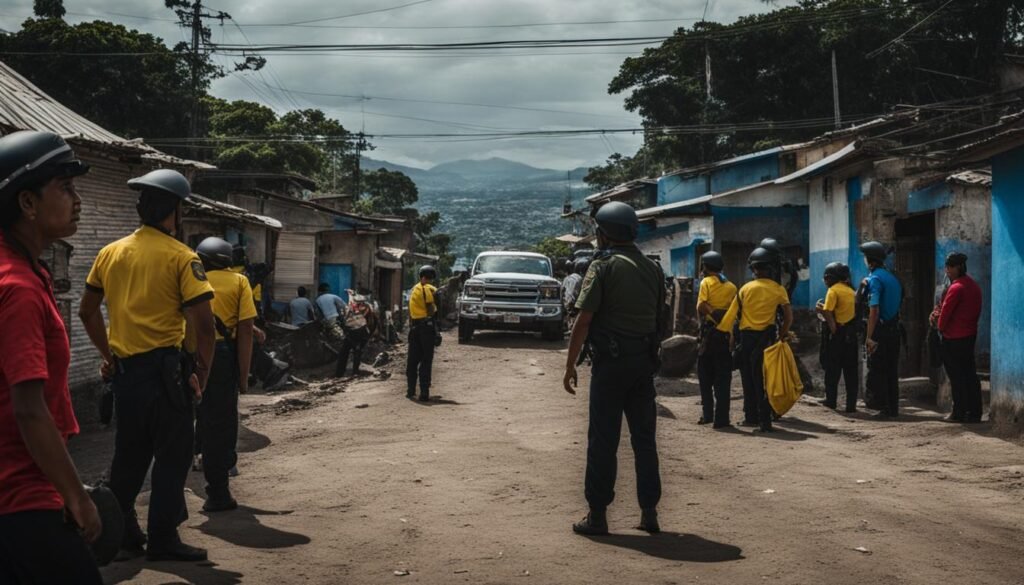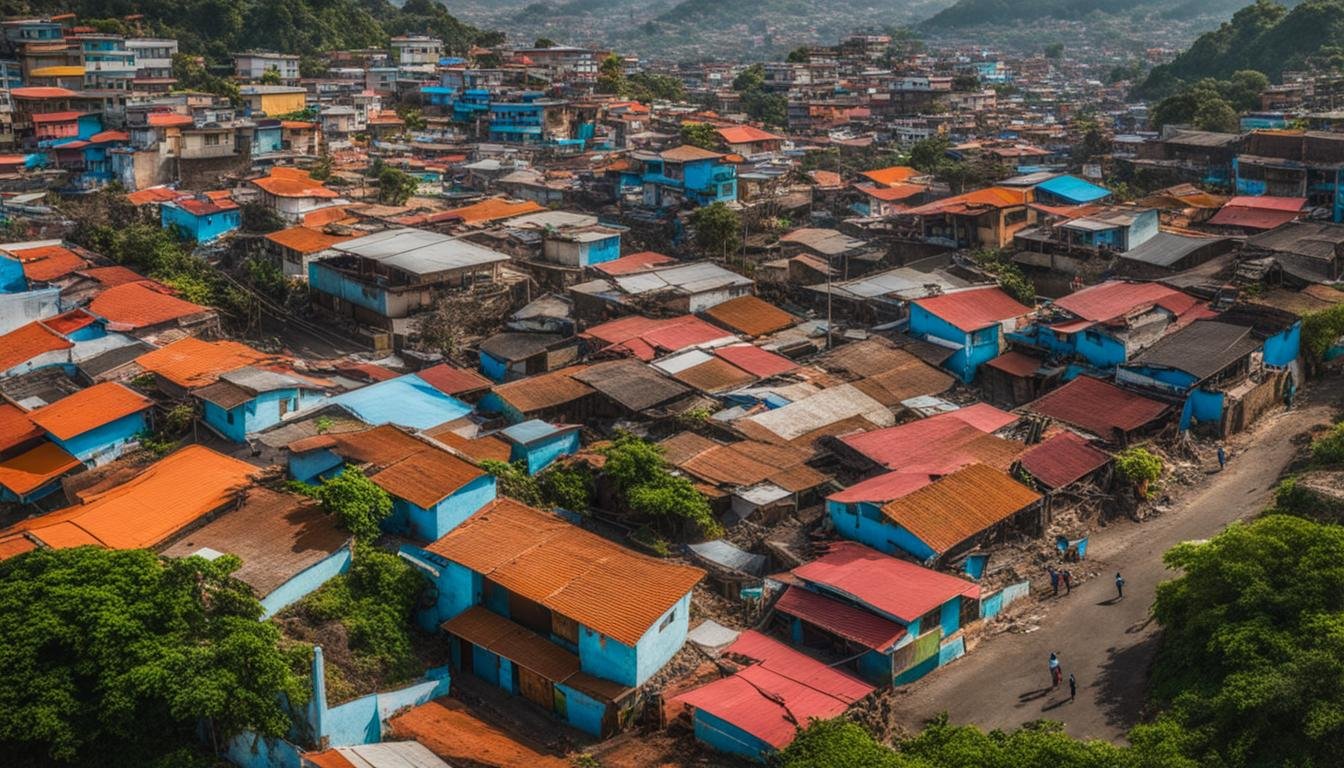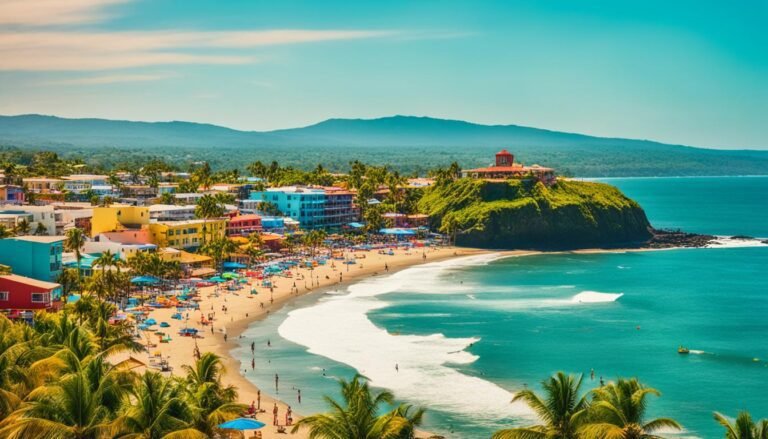El Salvador has experienced significant improvements in safety over the past three years. The country has seen a reduction in violence and an overall improvement in security. These positive changes can be attributed to the implementation of various security measures and crime prevention initiatives.
Key Takeaways:
- El Salvador has become safer compared to three years ago.
- Improved safety is the result of enhanced security measures and crime prevention initiatives.
- There has been a reduction in violence and an overall improvement in security.
- President Nayib Bukele’s safety initiatives have played a crucial role in achieving these positive changes.
- A balance between security and the preservation of democratic rights is necessary for long-term stability.
El Salvador’s Violent History: From Civil War to Gang Violence
El Salvador has a tumultuous past marred by violence, beginning with the civil war that raged from 1979 to 1992. This brutal conflict resulted in the loss of countless lives, with an estimated death toll exceeding 75,000. It left scars on the nation’s social fabric and contributed to the socio-economic challenges that El Salvador faces even today.
Following the civil war, the country was plagued by the rise of powerful gangs, most notably MS-13 and 18 Barrio. These gangs unleashed a reign of terror, engaging in drug and human trafficking, extortions, and other criminal activities. Their presence created an atmosphere of fear and insecurity, impacting both locals and migrants seeking a better life.
The gang violence in El Salvador reached alarming levels, leading to a mass exodus of Salvadorans who fled seeking safety and better opportunities abroad, particularly in the United States. This migration wave significantly affected the country’s demographics and further eroded its stability. The consequences of the civil war and the subsequent gang violence have had a lasting impact on the nation, shaping its trajectory and the challenges it faces today.
Table: El Salvador’s Violent History
| Period | Event |
|---|---|
| 1979-1992 | Civil War resulting in over 75,000 deaths |
| 1992-present | Rise of powerful gangs, including MS-13 and 18 Barrio |
| Post-Conflict | Gang violence impacting locals and leading to mass migration |
The Impact of Gang Violence on Safety
Gang violence has had a significant impact on the safety of El Salvador, affecting both locals and tourists. The presence of gangs has created a sense of insecurity among the population, making daily life challenging and discouraging tourism. While tourists have generally been left alone as they contribute to the local economy, there is still a risk of being caught in crossfire or becoming a target for theft.
The safety concerns caused by gang violence have hindered the development and growth of El Salvador. Local communities live in fear, with limited opportunities for economic advancement and social progress. The presence of gangs not only threatens the physical safety of individuals but also undermines the overall well-being of society, stifling investment, and hindering development.
To better understand the impact of gang violence on safety, let’s take a look at some key statistics:
| Statistic | Impact |
|---|---|
| Violent Crimes | High rates of gang-related violence, including homicides |
| Property Crimes | Increase in theft, burglary, and robbery |
| Social Disruption | Disintegration of communities, fear among residents |
The table above highlights the various negative impacts of gang violence on safety. These issues not only affect the local population but also have a ripple effect on tourism, foreign investment, and the overall perception of El Salvador as a safe destination. It is crucial for the government and local authorities to address gang violence effectively to restore safety and stability in the country.
Nayib Bukele’s Safety Initiatives
In 2019, Nayib Bukele was elected as the new president of El Salvador. Under his leadership, El Salvador has seen a significant shift in safety and security. Bukele has taken bold and decisive actions to combat violence and improve the overall safety of the country.
One of Bukele’s key initiatives has been declaring gangs illegal and conducting mass arrests of gang members. This crackdown on gangs has directly contributed to a reduction in violence and has made El Salvador a safer place for both locals and tourists. By targeting the root causes of violence and taking proactive measures, Bukele has demonstrated his commitment to creating a safer environment for all Salvadorans.
Bukele has also implemented innovative strategies to enhance security and prevent crime. For example, he has utilized technology, such as surveillance cameras and mobile applications, to monitor and respond to criminal activity more effectively. These technological advancements have proven to be valuable tools in the fight against crime and have contributed to the overall improvement in safety.

Impact of Nayib Bukele’s Safety Initiatives
The impact of Nayib Bukele’s safety initiatives has been significant and far-reaching. The reduction in violence and improvement in safety have not only benefited the local population but have also had a positive effect on tourism and the overall image of El Salvador. With the implementation of Bukele’s safety measures, tourists can now feel more secure visiting the country, which has led to an increase in tourism and economic growth.
While Bukele’s approach has received praise for its effectiveness in combating violence, it has also drawn criticism from those concerned about the erosion of democratic institutions. It is essential to strike a balance between ensuring citizen security and upholding democratic principles to maintain long-term stability. By addressing these concerns and continuing to prioritize both safety and democracy, El Salvador can pave the way for a brighter future.
The Role of International Publicity and Tourism
President Nayib Bukele has focused on increasing international publicity for El Salvador to attract tourists and showcase the positive changes in the country. His efforts, such as hosting the ISA International Surfing Games, have helped promote El Salvador as a safe and attractive destination for tourists. The increase in tourism not only boosts the local economy but also contributes to the overall safety and stability of the country.
El Salvador’s recent transformation from a violence-ridden nation to a safer destination cannot be overstated. As international travelers become more aware of the positive changes happening in the country, they are increasingly drawn to the unique culture, natural beauty, and friendly people that El Salvador has to offer.
| International Publicity | Tourism Impact |
|---|---|
| Increased media coverage | Rise in international visitors |
| Positive portrayal in travel articles and blogs | Boosted revenue for local businesses |
| Social media influence | Job creation in the tourism sector |
| Participation in international events and conferences | Improved infrastructure and amenities |
“El Salvador is a hidden gem that has so much to offer. Its vibrant culture, picturesque landscapes, and warm hospitality make it a must-visit destination. The recent improvements in safety have only made it more appealing to travelers who are seeking unique experiences off the beaten path.” – Travel blogger
The international publicity garnered by El Salvador not only attracts tourists but also sparks interest from investors and businesses looking to capitalize on the growing market. This, in turn, leads to job creation, improved infrastructure, and better amenities for visitors. It is a cycle of growth that benefits both the local communities and the tourists who choose to explore the beauty of El Salvador.
As El Salvador continues to make strides in enhancing its safety and security, it is essential for the government and tourism industry to work hand in hand to ensure a positive visitor experience. By providing reliable information, promoting responsible tourism practices, and maintaining high safety standards, El Salvador can establish itself as a premier destination that offers not only adventure and relaxation but also peace of mind for travelers.
COVID-19 Safety Measures
Amid the ongoing COVID-19 pandemic, El Salvador has implemented stringent safety measures to prioritize the well-being of its residents and visitors. These measures are aimed at preventing the spread of the virus and ensuring a safe environment for everyone. El Salvador has been proactive in its approach, implementing a range of precautions to mitigate the risk of COVID-19 transmission.
First and foremost, temperature checks are conducted at various checkpoints, including airports, hotels, and public spaces. This helps identify individuals with high temperatures, a common symptom of COVID-19, and allows for immediate medical evaluation if necessary. Hand sanitizing stations are also readily available throughout the country, promoting proper hand hygiene and reducing the risk of infection.
In addition, wearing masks is mandatory in El Salvador to prevent the spread of the virus. This applies to both indoor and outdoor settings, ensuring the safety of individuals in public spaces. Travelers visiting the country are required to present a negative COVID-19 test result or proof of vaccination upon arrival, further bolstering safety measures and reducing the risk of imported cases.
| COVID-19 Safety Measures in El Salvador | Description |
|---|---|
| Temperature checks | Conducted at various checkpoints to identify individuals with high temperatures |
| Hand sanitizing stations | Readily available in public spaces for proper hand hygiene |
| Mandatory mask-wearing | Both indoors and outdoors to prevent the spread of the virus |
| COVID-19 testing/vaccination requirements | Travelers must present negative test results or proof of vaccination upon arrival |
These stringent COVID-19 safety measures in El Salvador have contributed to the country’s relatively low number of COVID-19 cases. By prioritizing the health and safety of its residents and visitors, El Salvador aims to maintain a safe environment for all, allowing individuals to explore and enjoy the country while mitigating the risk of COVID-19 transmission.
Bukele’s Approach and the Critics
President Nayib Bukele’s approach to combating violence in El Salvador has garnered both praise and criticism. While his safety initiatives have resulted in a significant reduction in violence and improved security, there are concerns about the erosion of democratic institutions.
Some critics argue that Bukele’s suspension of constitutional rights and consolidation of power go against the principles of democracy and human rights. They raise alarms about the potential for authoritarianism and the long-term implications for the country’s stability.
However, supporters of Bukele argue that his strong-handed approach was necessary to combat the pervasive gang violence and restore safety to the country. They believe that the ends justify the means and that Bukele’s actions have brought about tangible improvements in the lives of Salvadorans.
The Importance of Balancing Security and Democracy
As El Salvador moves forward, it is crucial to find a balance between security and democracy. While citizen security is of utmost importance, it should not come at the expense of democratic rights and institutions. Safeguarding the rule of law, an independent judiciary, and accountable police forces are essential for the long-term stability and prosperity of the country.
The Regional Impact of Bukele’s Popularity
President Nayib Bukele’s popularity and his approach to combating violence in El Salvador have had far-reaching effects beyond the country’s borders. Known as the “Bukele effect,” his success in reducing violence has influenced leaders in neighboring countries, including Honduras, Ecuador, Guatemala, and Mexico, who have taken similar authoritarian actions in their quest for improved security.
This regional impact is evident in the implementation of stricter security measures, the crackdown on gangs, and the erosion of democratic institutions. While these actions may initially bring about a sense of stability and reduce crime rates, they also pose risks to long-term democratic processes and the protection of individual rights.
The “Bukele effect” reflects a complex trade-off between security and democracy. While it is crucial to address the issue of violence and enhance citizen safety, it is equally important to ensure that these measures are carried out within the framework of democratic values and the rule of law. Striking a balance between security and democracy will require international support and collaboration to help guide El Salvador and other countries in the region towards sustainable solutions.
As El Salvador continues to navigate the challenges of balancing security and democracy, it is essential to critically examine the regional impact of Bukele’s popularity. While his approach may have achieved short-term improvements in violence reduction, the long-term consequences for democratic institutions and human rights must be carefully monitored and addressed to ensure the stability and prosperity of the region.
The Regional Impact at a Glance
| Country | Security Measures | Democratic Erosion |
|---|---|---|
| Honduras | Tougher crackdown on gangs | Restrictions on media and freedom of expression |
| Ecuador | Increased police presence | Suppression of opposition voices |
| Guatemala | Military involvement in crime control | Attacks on judiciary independence |
| Mexico | Deployment of military forces | Threats to human rights defenders |
The Path Forward: Balancing Security and Democracy
The future of El Salvador lies in finding a delicate equilibrium between security and democracy. While President Nayib Bukele’s safety initiatives have undeniably led to a decrease in violence and improved citizen security, concerns about democratic institutions remain. Moving forward, it is crucial for the country to prioritize the restoration of civil liberties and the strengthening of democratic principles.
El Salvador cannot afford to neglect the importance of strong democratic institutions, as they are the bedrock of long-term stability and prosperity. Independent judiciary and accountable police forces are essential to ensure that the rule of law prevails and that the rights of citizens are protected. This requires ongoing efforts to strike a balance between effective security measures and the preservation of democratic rights.
International Support for El Salvador’s Journey
The path forward for El Salvador in achieving this delicate balance is through international support. The United States and other partners can play a critical role in providing the necessary resources, expertise, and guidance to help El Salvador navigate this complex journey. By collaborating with international entities, El Salvador can tap into a wealth of knowledge and best practices to strengthen its democratic institutions while maintaining the gains made in citizen security.
International support should not only focus on security-related aspects but also emphasize the importance of promoting transparency, accountability, and civic participation. By prioritizing these values, El Salvador can solidify its democratic foundation, ensuring that the progress made in reducing violence is sustainable and that the rights of its citizens are upheld.
| Table: International Support for Balancing Security and Democracy in El Salvador |
|---|
| 1. Financial aid to support democratic institutions |
| 2. Capacity-building programs for law enforcement agencies |
| 3. Technical assistance to strengthen the judiciary |
| 4. Support for civil society organizations promoting human rights |
| 5. Facilitating dialogue and cooperation between government and civil society |
| 6. Encouraging transparency and accountability in governance |
With international support and a steadfast commitment to democratic values, El Salvador has the potential to overcome the challenges it faces. By navigating the delicate balance between security and democracy, the country can pave the way for a safer, freer, and more prosperous future for all its citizens.

Conclusion
El Salvador has experienced significant positive changes in terms of safety in recent years under the leadership of President Nayib Bukele. Through the implementation of effective security measures and crime prevention initiatives, the country has become safer for its residents and visitors.
The dedication of President Bukele to combat violence and improve security has resulted in a noticeable reduction in violence and an overall improvement in safety. His actions, such as declaring gangs illegal and conducting mass arrests, have contributed to the positive transformation of El Salvador.
Although concerns about the erosion of democratic institutions exist, it is important to acknowledge the progress made in terms of safety. Moving forward, the focus should be on finding a balance between security and democracy. By maintaining strong democratic institutions and promoting accountability, El Salvador can continue its journey towards a safer and prosperous future.
FAQ
Has safety in El Salvador improved in recent years?
Yes, the safety situation in El Salvador has significantly improved in recent years.
What were the main causes of violence in El Salvador?
El Salvador experienced violence due to the civil war that lasted from 1979 to 1992 and gang violence from groups like MS-13 and 18 Barrio.
How did gang violence affect the safety of locals and tourists?
Gang violence primarily targeted locals, but there was still a risk of becoming caught in crossfire or becoming a target for theft.
What safety initiatives were implemented by President Nayib Bukele?
President Nayib Bukele implemented measures such as declaring gangs illegal and conducting mass arrests of gang members.
How has international publicity and tourism helped improve safety in El Salvador?
International publicity and increased tourism have contributed to the overall safety and stability of the country.
What COVID-19 safety measures are in place in El Salvador?
El Salvador has implemented measures such as temperature checks, hand sanitizing stations, mask requirements, and the requirement of a negative COVID-19 test or proof of vaccination for travelers.
Are there any criticisms of President Nayib Bukele’s approach?
Yes, some critics raise concerns about the erosion of democratic institutions and the consolidation of power.
How has Bukele’s popularity influenced other leaders in the region?
The “Bukele effect” can be seen in other countries where leaders are taking similar authoritarian actions in their quest for improved security.
What is the path forward for balancing security and democracy in El Salvador?
It is crucial for El Salvador to strike a balance between security and democracy by focusing on strong democratic institutions, an independent judiciary, and accountable police forces.
Has there been overall positive change in El Salvador’s safety situation?
Yes, there have been positive changes in El Salvador’s safety situation due to the implementation of security measures and crime prevention initiatives.






